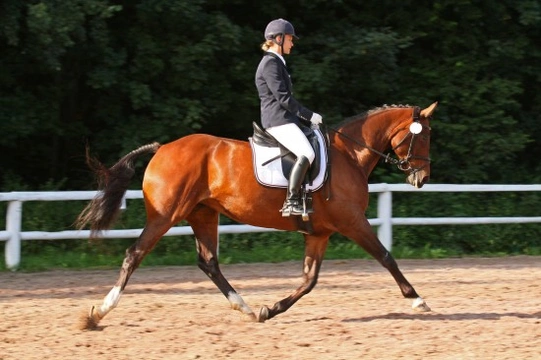
Do You Think Your Sport Horse Has a Big Heart? It Might be True
If you own a horse that gives you everything they have when competing you may well say to yourself and others that your mount is one of the best and that they have a big heart"". In fact, this might not be that far from the truth, especially if you happen to own a sport horse because they often literally have massive hearts as compared to other horses!
The Downside of a Horse Having an Enlarged Heart
However, there's a downside to a horse having an extra large heart because all too often, they may also have a heart murmur or arrhythmias. In horses, an enlarged heart is often referred to as an ""athlete's heart"" and while the conditions associated with it might make you feel slightly anxious there is no evidence that an enlarged or ""athletes heart"" is responsible for horses suddenly dropping dead during exercise or immediately afterwards.
The one thing that these studies do confirm, is that horses with big hearts tend to achieve ""big"" wins. The research proved what many horse people have been claiming for a long time, that horses with bigger hearts tend to win more races than horses with normal size ones. In fact, the majority of race horses and sport horses are bred specifically with the gene responsible for having an enlarged heart to increase their chances of winning.
Breeding & Training in Thoroughbreds
Thoroughbreds are chosen for their speed which means breeding and training are all-important. However, speed and larger hearts go hand-in-hand because many race horses boast this genetically inherited trait. With this said, as horses are put through intensive training their hearts continue to grow and this leads to them having what is known as an ""athlete's heart"".
The same can be said for sport horses that are bred to achieve great things when competing and again, the intensive training they go through sees their hearts continue to grow until they develop ""athlete's hearts"".
Sudden Death & Big-heart Syndrome
The jury is still out on whether sudden death and big-heart syndrome is connected in any way. In humans, an enlarged heart can be responsible for a cardiac arrest, but whether it's the same with horses is still a bit of a mystery. With this said, a human heart works differently to that of a horse.
In people, the heart pumps blood at an increased rate when a person is exercising which is typically around four to five times more than when they are at rest! In horses the heart can pump a much larger amount of blood when a horse is put through their paces which can be up to 16 times more than when they are at rest which means their hearts work much harder when under pressure.
What Causes Sudden Death?
Over recent years, quite a few famous horses have made the news because of the way they suddenly died either during training or when taking part in a race or competition. However, many trainers and vets believe it would be a mistake to put their sudden deaths down to their training, stating that a few other reasons could be responsible for this happening, two of which are listed below:
- Leaky cardiac valves
- Cardiac arrhythmias
Both of the above could be cause for concern for people who think their horses have an enlarged or athlete's heart. However, it would be very hard for a vet to confirm whether a horse has suffered any cardiac arrhythmias in the past when carrying out a post mortem should a horse suddenly drop dead without warning.
It's perfectly normal for an owner who regularly competes a sport horse to worry about ""sudden death"" syndrome and whether their mounts do indeed have an enlarged ""athlete's heart"". But as previously mentioned, there is no direct proof that horses with bigger hearts are more at risk of dropping dead during exercise or just afterwards because a lot more research needs to be done before drawing any final conclusions.
Conclusion
If you own a sport horse and one that really gives you their all during training and when competing, you may have often thought they had a ""big heart"". The reality is that a lot of sport horses and thoroughbreds boast having the big heart ""gene"" and they do so for a reason. Horse with enlarged hearts which are referred to as an ""athlete's heart"" are known to win more races and as such are bred specifically with this gene. Studies into sudden-death have not confirmed that having a larger heart could be responsible for a horse suddenly dying during exercise or afterwards and that more research is needed to confirm whether this is true or not.
""



